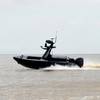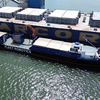Alfa Laval Tallies LPG Fuel Supply Systems Order in Japan
Alfa Laval said it has won an order for three units of the Alfa Laval FCM LPG, the low-flashpoint fuel supply system (LFSS) developed in partnership with MAN Energy Solutions.
The LFSS order was signed in December 2020 with IMEX Co., Ltd., which builds MAN Energy Solutions licensed engines in Japan as a subsidiary company of Hitachi Zosen Corporation. The order comprises three Alfa Laval FCM LPG systems that will be installed on three Japanese LPG carriers.
According to Alfa Laval, Using LPG cargo as fuel is an attractive solution on such vessels, since it reduces SOx emissions to near zero and provides easy compliance with the global sulphur cap.
“LPG as fuel is a new application with demonstrated challenges, such as the risk of interruptions and unplanned fuel changes if the filtration is insufficient to remove LPG’s impurities,” said Alfa Laval’s Viktor Friberg, head of marine separation. “The FCM LPG builds on Alfa Laval’s deep fuel treatment knowledge and our long history with engine applications, but it also works seamlessly with the shipowner’s chosen cargo handling system.”
The LFSS core developed by Alfa Laval and tested with MAN Energy Solutions is placed within an adaptable system framework, making it easy to match both the available space and the cargo handling equipment, Alfa Laval said.
“The FCM LPG can be adapted to the layout and routines of any cargo handling system,” Friberg said. “This ensures complete integration and flawless operation – so the LPG carrier experiences the best of both worlds.”
The three FCM LPG modules will be delivered to IMEX beginning in the fourth quarter of 2021. After each engine is tested, it will be moved with the FCM LPG system to Sasaki Shipbuilding Co., Ltd. for installation.
“These will be the first ME-LGIP engines delivered for us by IMEX,” said Kjeld Aabo, director new technology two-stroke at MAN Energy Solutions.
As emission limits and climate goals cause marine fuels to diversify, Alfa Laval is supporting a variety of fuel choices under the Fuel Conditioning Module (FCM) concept, the company said, noting Alfa Laval FCM Methanol systems, for example, are now approaching 100,000 running hours. LPG is an important fuel in its own right, but it also represents an important step on the path to ammonia.
“Ammonia is widely seen as the ideal fuel for tomorrow’s zero-carbon operations,” Friberg said. “Marine engines that run on ammonia will be available in less than three years, and Alfa Laval will be ready. Due to technical similarities between LPG and ammonia operation, the FCM LPG has been a powerful springboard for our ongoing development of an ammonia fuel supply system.”













